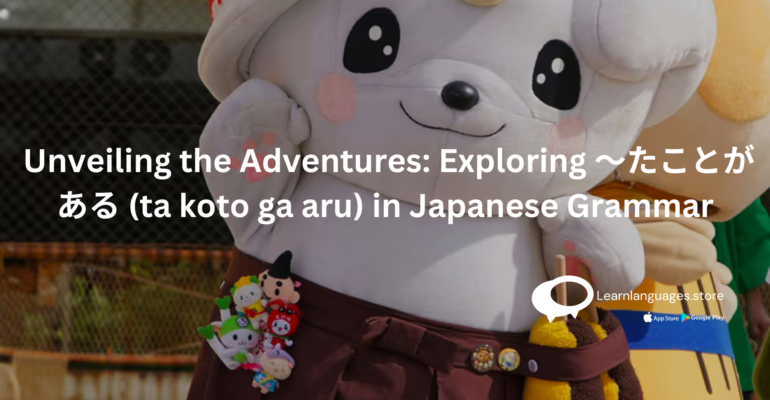Unveiling the Adventures: Exploring 〜たことがある (ta koto ga aru) in Japanese Grammar
Unveiling the Adventures: Exploring 〜たことがある (ta koto ga aru) in Japanese Grammar
Estimated reading time: 4 minutes

INTRODUCTION:
Konnichiwa, language enthusiasts! Today, let’s embark on a thrilling journey through the fascinating world of Japanese grammar with a focus on „Äú„Åü„Åì„Å®„Åå„ÅÇ„Çã (ta koto ga aru), the key to expressing past experiences and adventures. Whether you’ve climbed Mount Everest or simply tried sushi for the first time, „Äú„Åü„Åì„Å®„Åå„ÅÇ„Çã (ta koto ga aru) is your passport to sharing your tales with flair and excitement. So, fasten your seatbelts and let’s dive into this linguistic adventure together!
What is 〜たことがある (ta koto ga aru)?
In Japanese grammar, „Äú„Åü„Åì„Å®„Åå„ÅÇ„Çã (ta koto ga aru) is a phrase used to indicate that one has had a certain experience in the past. It’s like unlocking a treasure chest of memories and proudly declaring, “I have done this before!” Whether it’s skydiving over the Great Barrier Reef or getting lost in the bustling streets of Tokyo, „Äú„Åü„Åì„Å®„Åå„ÅÇ„Çã (ta koto ga aru) allows you to share your adventures with vivid detail and nostalgia.
Sentence Structure:
The basic structure for forming sentences with 〜たことがある (ta koto ga aru) is as follows:
[Past form of verb] + ことがある (koto ga aru)
Now, let’s break it down with some examples:
- 寿司を食べたことがあります。(Sushi o tabeta koto ga arimasu.) (I have eaten sushi before.)
- パリに行ったことがあります。(Pari ni itta koto ga arimasu.) (I have been to Paris before.)
- スカイダイビングをしたことがありますか?(Sukaidaibingu o shita koto ga arimasu ka?) (Have you ever been skydiving?)
Examples with Humor:
- ラーメンを食べたことがある?(Ramen o tabeta koto ga aru?) (Have you ever eaten ramen?) Picture yourself asking this question to a friend, with a mischievous twinkle in your eye. After all, who can resist the temptation of slurping up delicious noodles in savory broth?
- 大雨の中、迷子になったことがあります。(Ooame no naka, maigo ni natta koto ga arimasu.) (I have gotten lost in heavy rain before.) Imagine recounting this tale of misadventure with a wry smile, recalling the frantic search for shelter and the unexpected encounters along the way.
- パーティーでネズミに追いかけられたことがありますか?(Paatii de nezumi ni oikakerareta koto ga arimasu ka?) (Have you ever been chased by a mouse at a party?) A humorous question to break the ice and share amusing anecdotes of unexpected encounters. Just be prepared for some laughter and maybe a few shrieks of surprise!
Exceptions and Usage:
While 〜たことがある (ta koto ga aru) is a versatile tool for expressing past experiences, there are a few exceptions and nuances to keep in mind:
- Negation: To express that you have not had a certain experience, simply conjugate the verb in its negative past form before adding 〜ことがない (koto ga nai) instead of 〜ことがある (koto ga aru). For example: 寿司を食べたことがない。(Sushi o tabeta koto ga nai.) Р(I have never eaten sushi.)
- Politeness: To make your statement more polite, you can replace あります (arimasu) with ございます (gozaimasu) in formal situations. For example: 寿司を食べたことがございます。(Sushi o tabeta koto ga gozaimasu.)
Conclusion:
Congratulations, dear readers! You’ve now unlocked the power of „Äú„Åü„Åì„Å®„Åå„ÅÇ„Çã (ta koto ga aru) and can confidently share your past experiences and adventures in Japanese with humor and vivid detail. Whether you’re reminiscing about unforgettable journeys or quirky encounters, „Äú„Åü„Åì„Å®„Åå„ÅÇ„Çã (ta koto ga aru) is your ally in weaving tales that captivate and entertain.
Arigatou gozaimasu for joining me on this linguistic journey. Until next time, mata ne! üéå
-
Product on sale
 Japanese N3
Japanese N3₹42,600.00
₹62,600.00 -
Product on sale
 Japanese N4
Japanese N4₹24,300.00
₹32,600.00 -
Product on sale
 Japanese N5
Japanese N5₹18,300.00
₹24,300.00
Learn Languages Store
Vashi,
Email: services@learnlanguages.store










